About ten years ago, two deaths in my family sent me searching through old boxes and files for a picture someone had taken during a camping trip in southern Illinois around 1970. My obsession worsened for about a month until the person most affected by those deaths sent me a scan of the photograph.
My cousin Bruce stood in the back with his son Randy in his arms. Bruce's wife, Charlotte, who sent me the scan, was in the lower right. Charlotte's grandfather, mother, father, and some of her parents' friends stood beside Bruce and Randy. Bruce's mom—my Aunt Gladys—sat next to Charlotte. Next to Aunt Gladys was my mom, and next to my mom was my stepfather Cy. Across from Cy, at the far left corner of the table, was my mom's brother and Bruce's father, Uncle Floyd. My cousin Keith and I were sitting at the table in the lower left of the picture.
Uncle Floyd is the man I most admired when I was a kid. He went to Europe to fight in World War II, made his living as a maintenance mechanic for Southern Illinois University, raised a plentiful garden in the country, and hunted and fished the way I wanted to hunt and fish. He had a broad and contagious smile—the type that quickly shattered cultural and class boundaries—so it was not surprising that when they learned his last name was Holliday, many of the university professors respectfully called him Doc. I remember a biology professor visiting often to ask Doc for gardening advice. Looking back, I don't think the professor cared much about gardening. He just liked taking with Uncle Floyd, and Uncle Floyd liked talking with him.
As a boy, I had limited relationships with men in general and father figures in particular. My father left before I was old enough to know him, and my mom remarried a man named Jack Schulz, whom I liked so much I took his last name. But he died when I was six. She married my second stepfather, Cy, around the time of this picture, and although I liked him at times, I could never get used to the yelling and cussing whenever he and my mom drank too much. They probably shared equal blame for the outbursts, but I never doubted whose side I was on.
Although my mom taught me to fish her way, over time, I wanted to fish like Uncle Floyd and Bruce. Mom taught me to fish like Huck Finn and Tom Sawyer with bait, bobbers, and infinite patience. But Uncle Floyd and Bruce fished like Roland Martin and Bill Dance with Rapalas and Hula Poppers and Jitterbugs they cast and retrieved over and over again without having to fight boredom while wishing and waiting to see the glorious place in the water where the bobber used to be. Mom wasn't much impressed with Bruce's method of fishing, but because she believed he was the perfect example of how a young man should live his life, she encouraged him to take me fishing as much as possible. “Grow up to be like Bruce,” she'd say, “and find yourself a sweet girl like Charlotte.” I was only nineteen when my mom died, so I don't know if she'd be satisfied with the way I've lived my life. But although she never met my wife, Roxanne, I am sure she'd approve of that.
More Like This
Uncle Floyd, Bruce, and Cy all influenced my life in significant ways, but when Charlotte sent the photo, the young boy in the lower left was the person I’d been thinking about most. He was my cousin Keith, and I was the kid with the sheepish look sitting beside him. Keith was Bruce and Charlotte's first son, so, strictly speaking, he was my cousin once removed, but I always just called him my cousin.
My relationship with Keith was different from that with anyone else I knew in those years. We spent a lot of time together, but we didn't play the way I played with other friends. When we were stuck inside and bored, for instance, we'd do things like look through the J.C. Penney catalog. Like most boys my age, I'd be interested in toys, balls, fishing poles, bikes, and maybe even guns, but Keith looked at the clothes.
“What do you think about this shirt?” he'd ask, pointing to some shirt that, to me, looked like all the others on the page.
“Looks okay,” I'd say.
I didn't think kids were supposed to fantasize about new clothes, but I had to concede it was kinda fun, and the stuff Keith said looked nice did, indeed, look nice. And while many of my other friends listened to music I didn't like much, Keith liked Elton John, and I had to admit I did, too. But we’d often part ways when it came to spending time outdoors. I'd follow Uncle Floyd and Bruce around the yard and pester them to take me fishing. Keith would stay inside and talk with my mom and Aunt Gladys.
On our drives home after a visit, Mom and Cy would talk about how something was different with Keith. Between swigs of Falstaff from a can he’d wrapped in a paper towel so the police couldn't see him drinking beer in the car, Cy would say it wasn't right for a kid to want to talk with the women so much. Mom would agree. I understood what they were saying, but for me, the thing that stood out most about Keith was that he was the nicest boy I knew.
Keith and I saw each other less often as we grew older, and after my mom died and I moved to California, we lost touch completely. When Uncle Floyd died in the early 90s, I flew back from Michigan, and Keith flew back from Texas. After the funeral, I went with Keith to a riverboat casino to have a few drinks and play the slot machines. At some point in the night, Keith started laughing and said, “I don't think we're having a few drinks anymore, Timmy. We are flat out drinking now.” Later that night, we sat on the kitchen floor in his parent’s house and ate the leftover food from the wake. We mostly joked and laughed, but Keith got serious and told me how excited he was about President Clinton. “Timmy,” he said, “I know some people don't think you should let one issue define your politics, but it's hard not to when the one issue is who you are and how you find happiness in life.” We both flew home the next day, and that was the last time I talked to Keith.
When the hospital Keith worked for “downsized” his job, Keith and his partner Greg moved back to Illinois to be near Keith's mom, his dad, his brother Randy, and Randy's wife Stacy. There, they'd be close to the people who loved them for who they were and how they found happiness in their lives. But when Greg—who had been Keith's life partner for seventeen years—died that May, Keith's heart broke. He fell into a deep depression. Much of the happiness he had found was gone. Then, when Keith's father, Bruce, died a week before Christmas, his heartbreak and depression intensified. Two months later, Charlotte took Keith to the hospital with symptoms of pneumonia, and a few days after that, at 4 a.m. on February 14, Keith's broken heart stopped beating.
People sometimes ask why I like to fish so much. I don’t know how to answer that question. Just like I don’t know how to tell you why Keith didn’t. Sure, there are easy answers if we want them. But easy answers are like maps that show borders without blood. Answering why is difficult when the answers to most of our questions beget more questions.
Hundreds of miles and decades separated Keith and me then, so I learned all the details of Keith's last years from Stacy. When she finished by saying Keith got to be with Greg for Valentine's Day after all, I cried.

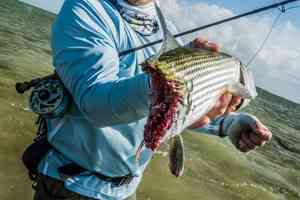
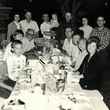


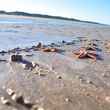
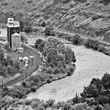
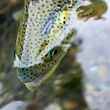

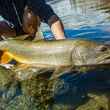


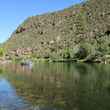

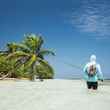

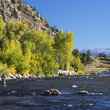
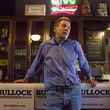



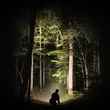



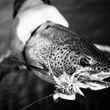

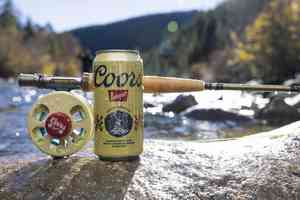

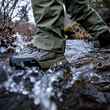
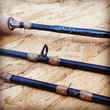
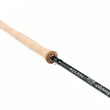
Comments